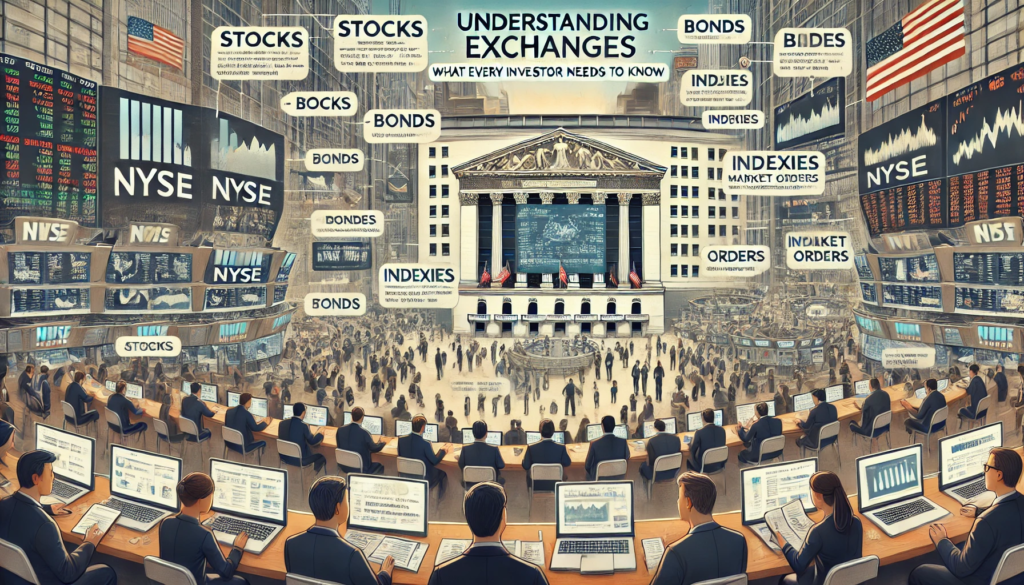When it comes to investing, understanding exchanges is crucial for making informed decisions. Exchanges serve as the marketplace where securities, such as stocks, bonds, and commodities, are bought and sold. They play a pivotal role in the financial system, providing liquidity and price discovery for investors.

Types of Exchanges
Exchanges can be categorized into two main types: stock exchanges and commodities exchanges. Stock exchanges, such as the New York Stock Exchange (NYSE) and the Nasdaq, specialize in trading stocks and other securities. On the other hand, commodities exchanges, like the Chicago Mercantile Exchange (CME) and the London Metal Exchange, focus on trading commodities like gold, oil, and agricultural products.
Each exchange has its own set of rules and regulations governing trading activities. It’s essential for investors to understand these rules to navigate the market effectively.
How Exchanges Work
Exchanges provide a platform for buyers and sellers to come together and execute trades. The price of securities is determined through the interplay of supply and demand. This price discovery mechanism ensures that securities are traded at fair market value.
Exchanges also play a crucial role in ensuring transparency and efficiency in trading. They provide real-time information on prices, volumes, and other relevant data, allowing investors to make informed decisions.
Key Players in Exchanges
Several key players operate within exchanges, including brokers, market makers, and regulatory bodies. Brokers act as intermediaries between buyers and sellers, facilitating trades on behalf of their clients. Market makers help maintain liquidity by quoting both buy and sell prices for securities. Regulatory bodies, such as the Securities and Exchange Commission (SEC) in the U.S., oversee exchanges to ensure fair and orderly trading.
The Role of Technology
Technology has transformed the way exchanges operate in recent years. Electronic trading platforms have replaced traditional floor trading, making the process faster and more efficient. High-frequency trading (HFT) has also gained prominence, allowing traders to execute large volumes of trades at lightning speed.
While technology has brought many benefits to the market, it has also raised concerns about market manipulation and systemic risk. It’s essential for investors to stay informed about technological advancements in exchanges to navigate the changing landscape effectively.
Key Takeaways
- Exchanges serve as marketplaces where securities are bought and sold.
- Stock exchanges and commodities exchanges are the two main types of exchanges.
- Exchanges facilitate price discovery, transparency, and efficiency in trading.
- Key players in exchanges include brokers, market makers, and regulatory bodies.
- Technology has revolutionized exchanges, leading to faster and more efficient trading.
FAQs
Q: How do I invest in securities through an exchange?
A: To invest in securities, you need to open a brokerage account with a registered broker and place buy or sell orders through the exchange.
Q: Are all exchanges regulated by government authorities?
A: Yes, exchanges are subject to oversight by regulatory bodies to ensure fair and orderly trading.
Q: What is the role of market makers in exchanges?
A: Market makers help maintain liquidity in the market by providing buy and sell quotes for securities.
Q: Can I trade on multiple exchanges simultaneously?
A: Yes, investors can trade on multiple exchanges to access a wider range of securities and trading opportunities.
Q: How can I stay informed about market developments on exchanges?
A: You can stay informed by following financial news, monitoring market data, and staying up to date on regulatory changes affecting exchanges.
Understanding exchanges is essential for every investor looking to navigate the market successfully. By grasping the key concepts and dynamics of exchanges, investors can make informed decisions and capitalize on trading opportunities effectively.


